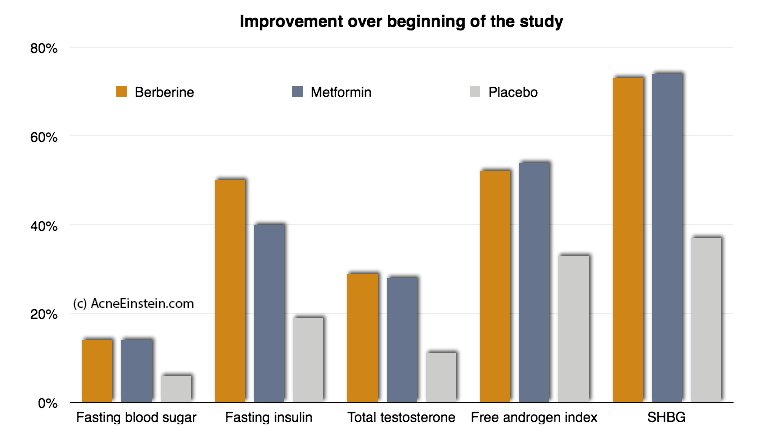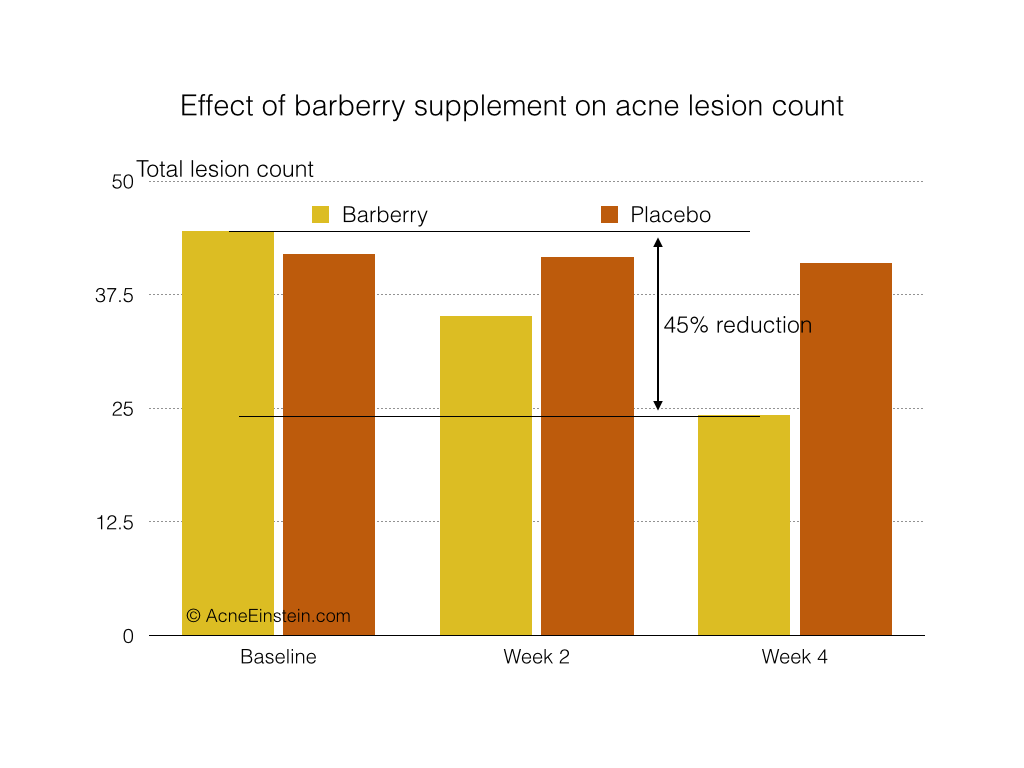Berberine is a substance found in Oregon grapes, Barberry, and some Chinese plants. It’s used as a treatment for diabetes in Traditional Chinese Medicine. It’s the only other supplement that has been shown to be as effective as the currently prescribed drugs for diabetes.
Most studies on berberine have been done on PCOS patients, which, as we have talked earlier, is a good proxy syndrome for female hormonal acne. Not to mention that something like half of the female adult acne patients have cystic ovaries, and female adult acne is a risk factor for full PCOS.
One of the best studies was done by Yuan et al. in 2013. They gave 150 women either a berberine, metformin (a prescription drug that lowers insulin levels), or a placebo pill.
This graph shows the effect on acne-relevant measures.

Source: An, Y. et al. The use of berberine for women with polycystic ovary syndrome undergoing IVF treatment. Clin. Endocrinol. (Oxf) (2013). https://onlinelibrary.wiley.com/doi/10.1111/cen.12294/abstract
As you can see, berberine worked as well or even better than metformin in reducing acne-related hormonal measures.
One caveat about this study. The participants were infertile and likely had much larger hormonal imbalances that most women with adult acne. They were also highly insulin resistant.
That said, a 2007 study by Tan et al. showed that metformin reduced acne in lean PCOS patients who were not insulin resistant. Six-month treatment with metformin reduced insulin resistance to the same level as lean women without PCOS and testosterone levels dropped by 31%. Before the treatment, 31.8% of the women had acne, and after the treatment only 11.6% had. Given that several studies have shown berberine is as effective as metformin in reducing insulin resistance, I would expect berberine supplementation to have similar effects.
These results are in line with other studies, but I’m not going to bore you by going through all of them. The point is that there’s good evidence to show that insulin sensitizing drugs help to rebalance hormones, even in women who aren’t insulin resistant.
Similarly, studies show berberine can be as effective as prescription drugs in treating type-2 diabetes.
In Traditional Chinese medicine berberine is used to treat ‘heat’ and ‘dampness’, which roughly correlate with inflammation in scientific medicine. Indeed, dozens of test tube and animal studies have shown berberine has strong anti-inflammatory effects. Unfortunately, only one human study has measured the anti-inflammatory effect of berberine. A study on people with type-2 diabetes showed that berberine reduced some, but not all, markers of inflammation.
Also reduces acne
This talk about berberine helping with acne is not purely theoretical. In 2012, Iranian researchers showed that barberry supplements reduced acne by 45% in four weeks. Berberine is one of the active ingredients in barberry. In the study, the researchers gave 50 teenagers (aged 12 to 17) either 600mg of barberry or a placebo supplement for four weeks. The participants were both male and female, in about 50/50 ratio.
This graph shows the effect on total lesion count (total number of pimples) for both the treatment and placebo groups.

Source: Fouladi, R. F. Aqueous extract of dried fruit of Berberis vulgaris L. in acne vulgaris, a clinical trial. J Diet Suppl 9,253–61 (2012). https://www.ncbi.nlm.nih.gov/pubmed/23038982
The number of both inflammatory and non-inflammatory pimples dropped roughly by the same amount (~45%).
Unfortunately, the researchers didn’t measure hormone levels, so we can’t say what caused the improvement. They speculate it could be because of the antioxidants in barberry, but I suspect that the insulin and androgen-lowering effect of berberine also had something to do with these results.
Dosage
The doses used in the studies on insulin resistance and PCOS vary from 500 to 1500mg/day, divided into 2 or 3 different doses. However, higher doses seem to cause more side effects (even if they are mild), so I recommend not taking more than 1000mg/day.
Toxicity and side effects
None of the studies reported severe side effects. Some noted abdominal cramps and other gastrointestinal complaints. In most cases these were resolved by lowering the dose or taking berberine with meals.
According to a recent systemic review, people taking higher doses experience quite a bit more side effects. The percentage of people experiencing side effects varies by dosage:
- 600 mg/day; 5% experienced side effects
- 900 mg/day; 5.8%
- 900 – 1500 mg/day; 14.3%
- 1500 mg/day; 10.6%
These results are based on a relatively small number of studies, which also explains the anomaly with 1500 mg/day. The only real conclusion we can draw from this is that higher doses seem to cause quite a bit more side effects. That’s why I wouldn’t take more than 1000 mg/day.

